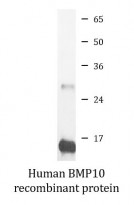ARG70096
Human BMP10 recombinant protein (Active) (His-tagged, C-ter)
Human BMP10 recombinant protein (Active) (His-tagged, C-ter) for SDS-PAGE
Overview
| Product Description | E. coli expressed, His-tagged (C-ter) Active Human BMP10 recombinant protein |
|---|---|
| Tested Application | SDS-PAGE |
| Target Name | BMP10 |
| Species | Human |
| A.A. Sequence | Asn317 - Arg424 |
| Expression System | E. coli |
| Activity | Active |
| Activity Note | Determined by its ability to induce alkaline phosphatase production by ATDC5 cells. The ED50 for this effect is 1.7-2.1 ng/mL. |
| Alternate Names | Bone morphogenetic protein 10; BMP-10 |
Properties
| Form | Powder |
|---|---|
| Purification Note | Endotoxin level is less than 0.1 EU/µg of the protein, as determined by the LAL test. |
| Purity | > 98% (by SDS-PAGE) |
| Buffer | 20 mM sodium citrate and 0.2 M NaCl (pH 3.5) |
| Reconstitution | It is recommended to reconstitute the lyophilized protein in 4 mM HCl to a concentration not less than 200 μg/mL and incubate the stock solution for at least 20 min at room temperature to make sure the protein is dissolved completely. |
| Storage Instruction | For long term, lyophilized protein should be stored at -20°C or -80°C. After reconstitution, aliquot and store at -20°C or -80°C for up to one month. Storage in frost free freezers is not recommended. Avoid repeated freeze/thaw cycles. Suggest spin the vial prior to opening. |
| Note | For laboratory research only, not for drug, diagnostic or other use. |
Bioinformation
| Gene Symbol | BMP10 |
|---|---|
| Gene Full Name | bone morphogenetic protein 10 |
| Background | The protein encoded by this gene is a member of the TGF-beta family of growth factors. Data suggest that the similar protein in mouse plays an important role in trabeculation of the embryonic heart. In human, this protein may signal through receptor serine/threonine kinases. [provided by RefSeq, Jul 2008] |
| Function | Required for maintaining the proliferative activity of embryonic cardiomyocytes by preventing premature activation of the negative cell cycle regulator CDKN1C/p57KIP and maintaining the required expression levels of cardiogenic factors such as MEF2C and NKX2-5. Acts as a ligand for ACVRL1/ALK1, BMPR1A/ALK3 and BMPR1B/ALK6, leading to activation of SMAD1, SMAD5 and SMAD8 transcription factors. Inhibits endothelial cell migration and growth. May reduce cell migration and cell matrix adhesion in breast cancer cell lines. [UniProt] |
| Cellular Localization | Secreted. [UniProt] |
Images (1) Click the Picture to Zoom In






